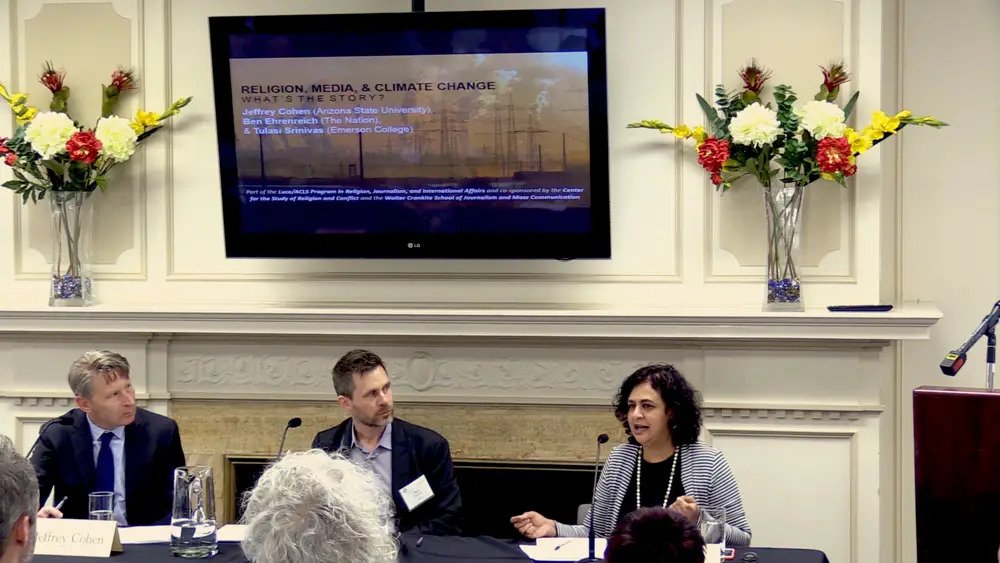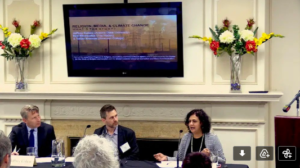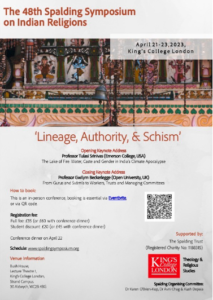Journalist Ben Ehrenreich (The Nation) says the media isn’t telling the right stories about climate change. Anthropologist and religious studies professor Tulasi Srinivas (Emerson College) argues that journalists and scientists are missing stories about how religions are transforming community responses to climate change, and how climate change is transforming religion.
featuring Jeffrey Cohen (Arizona State University), Ben Ehrenreich (The Nation), & Tulasi Srinivas (Emerson College)
Join Ehrenreich, Srinivas and moderate Jeffrey Cohen, ASU Dean of Humanities, for a conversation about these and other issues:
How does religion, media and climate change intersect in the international sphere? How do the policies of one nation impact climate change across regions or even across the globe? What stories does the media tell about this? What stories should the media tell about this? What religious voices are heard in global public discourse about climate change and what voices are left out? If religious voices influence climate change policy, how do the effects of climate change, in turn, change religious practice or belief—within and across faiths, and across different parts of the world? How do stories that pit religion and science against one another inhibit the development of new approaches and solutions?
How are “climate refugees” and the increasing movement of people across borders affecting religious and secular responses to climate change? How does the images created by the media fit into older conflict or disaster narratives? What new narratives can and should be told?
This event is sponsored the Luce/ACLS Program in Religion, Journalism, and International Affairs and co-sponsored by the Center for the Study of Religion and Conflict and the Walter Cronkite School of Journalism and Mass Communication.
Presenter Bios
Ben Ehrenreich is an award-winning journalist and writer who began working in the alternative press in the late 1990s, publishing extensively in LA Weekly and the Village Voice. Currently a columnist for The Nation, his journalism, essays and criticism have appeared in Harper’s, The New York Times Magazine, The Nation, the Los Angeles Times, The Believer, and the London Review of Books. He has reported from Afghanistan, Haiti, Cambodia, El Salvador, Mexico, Israel, and Palestine, as well as locations all throughout the United States. In 2011, he was awarded a National Magazine Award in feature writing for an article published in Los Angeles magazine.
He has published two novels, The Suitors (2006) and Ether (2011), and a co-authored mixed media work, Jenny Schmid: The Vistas of Gender Utopia (2008, with Jenny Schmid and Lisa Fischman), that includes images, essays and short fiction. Ehrenreich’s most recent book, The Way to the Spring: Life and Death in Palestine, was published in 2016 and based on reporting from the West Bank.
His writing for The Nation is increasingly dealing with climate change and climate change policy, including his most recent articles, “The Fire This Time,” “To Those Who Think We Can Reform Our Way Out of the Climate Crisis,” “The Hidden Climate-Change Story Behind Trump’s ‘National Emergency’,” and “Climate Change is Here—and it Looks Like Starvation.”
Tulasi Srinivas (Ph.D., Boston University) is a sociologist and anthropologist of religion with expertise on South Asia. She is the author and editor of 6 books, including, Winged Faith Rethinking Globalization and Religious Pluralism (2010); Curried Cultures: Food, Globalization and South Asia (2012) and The Cow in the Elevator: An Anthropology of Wonder (2018). Srinivas’s work has been supported by the NEH, the NSF, The Pew Foundation, and the Rockefeller Foundation, and she has held fellowships at the Center for the Study of World Religions at Harvard, the Berkley Center for Religion, Peace and World Affairs at Georgetown, and at the Kate Hamburger Kolleg in Bochum, Germany and the Radcliffe Institute for Advanced Study at Harvard.
Her current project, The Absent Goddess: Religion, Ecology and Violence in Urban India, is supported by a Luce/ACLS Fellowship on Religion, Journalism and International Affairs. In the project, Srinivas explores connections between religion, ethics and ecological degradation with a focus on Hindu conceptions of water as life and as divinity as they intersect with water management and sustainability policy discourse. Srinivas is particularly interested in understanding what happens to a religious imagination rooted in the natural. By studying women’s narratives of water pollution and flooding and journalists’ archives of rampant eco-destruction in Bangalore, India, Srinivas aims to expand Western debates on religion, science, violence, and ecological loss.
Jeffrey Cohen is Dean of Humanities and Professor of English in the College of Liberal Arts and Sciences at Arizona State University. With expertise in environmental humanities and medieval and early modern studies, he is the author, co-author or editor of 13 books, including, most recently, Veer Ecology: A Companion for Environmental Thinking (2018, with Lowell Duckert), Earth (2017, with Lindy Elkins-Tanton), Stone: An Ecology of the Inhuman (2015), Elemental Ecocriticism: Thinking with Earth, Air, Water, and Fire (2015, with Lowell Duckert) and Prismatic Ecology: Ecotheory Beyond Green (2013).
Cohen joined ASU in 2017. Prior to that, he was professor and chair of the department of English and founder of the Medieval and Early Modern Studies Institute at George Washington University in D.C.
As Dean of Humanities, Cohen is working to intensify ASU’s strengths in the environmental humanities; increase opportunities for the work of humanities scholars to reach wider publics; and ensure the next generation of scholars, teachers and researchers (especially in traditional fields) is the most diverse to date.
He currently serves, with Stacy Alaimo, as co-president of the Association for the Study of Literature and the Environment (ASLE), the largest professional organization in the environmental humanities. And his current book project, co-authored with Julian Yates, is titled Noah’s Arkive: Towards an Ecology of Refuge.


